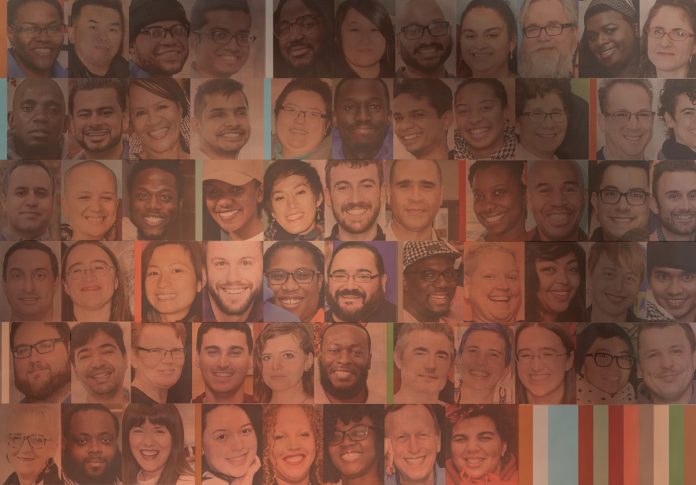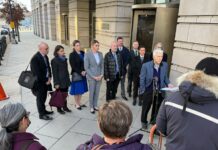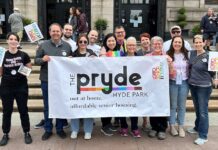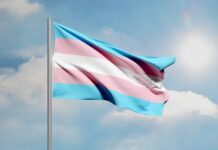Celebrate our many hues of intersectionality with these leading, local advocates and activists
Every individual has an identity. Every identity stands at an intersection.
Sex, gender, race, class, religion, economic and immigration status—we think of them, and many other markers, as roads that shape the direction of our experiences in the world.
These roads converge in endless combinations. We are gay white men. We are black trans women. We are nonbinary queers. We worship or we do not, we have more money or less. Keep going. There are so many spaces we occupy.
Such broad diversity is what makes our LGBTQ community so beautiful, but it is also why it is so important that our approaches to social organizing, activism and other forms of advocacy are equally varied. With so many multifaceted identities, ours is not a one-size-fits-all community. We also face different challenges and enjoy different opportunities, so our methods for bettering experiences must reflect that.
Thankfully, the Boston area is full of amazing organizations that explore and address LGBTQ people at various intersections. In these pages, you’ll find a few, hear their histories and meet some of the faces that power their vital work. There are so many more.
The traditional LGBTQ Pride rainbow only shows seven colors. But within every color, there are always many hues. And to paint the brightest picture, we must celebrate them all.
Mad Femme Pride
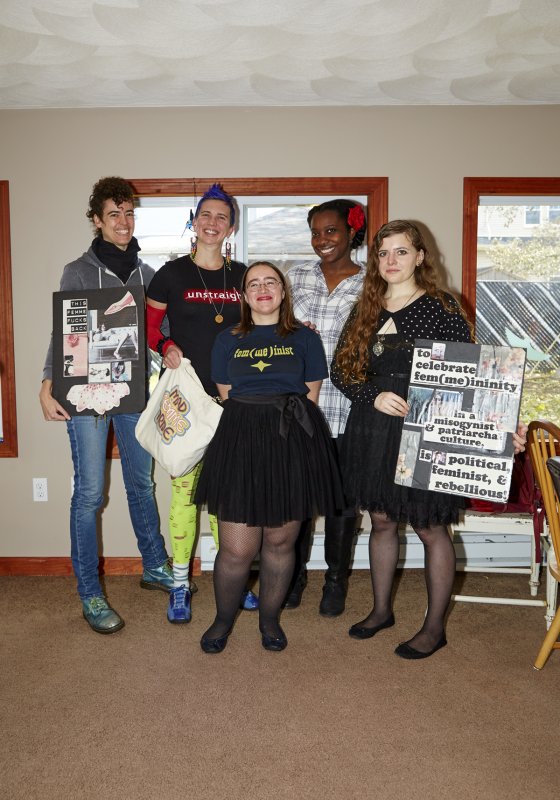
Always advocating for radical inclusion.
Intersections, by definition, do not occupy a single space. And it can be easy to get lost in the in-between.
“I knew I was femme before I knew I was a lesbian,” says Madeleine Blum, one of the main organizers behind Mad Femme Pride. The Boston organization, launched in 2004, boasts over 5,000 members of varying levels of engagement, and many of them have joined for the same reason as Blum:—finding support when forms of exclusion exist on all sides.
As a queer femme lesbian, Blum knows what it is like to have to “come out over and over again”—even to doctors, whose assumptions may prevent them from asking the appropriate questions about important issues like sexual health. She knows what it is like to be harassed by drunken straight bros at a bar who tell her she’s “too pretty to be a lesbian.” She knows what it is like to attend lesbian-focused events only to have her identity questioned by members of her own community. She knows what it is like to be othered over and over again.
That takes a toll. “It makes you feel like a lesser queer,” says Blum, who is also a member of the Hub-based rock band Unstraight.
Mad Femme Pride provides a space for femme-identified folks to gather, celebrate and advocate. The group’s events range from regular monthly book club meet-ups to the community picnics and the yearly Big Queer Show, a live music-filled soiree held during Pride month. Last year, Boston Pride included Mad Femme Pride among the annual recipients of its new Community Fund monetary grants. Blum says Mad Femme Pride used some of its award to ensure it could book event space that is accessible to all.
Indeed, while the organization was founded to center the femme experience, it also describes itself as “radically inclusive.” Mad Femme Pride takes, well, pride in embracing open-minded folks of all kinds. The organization places great emphasis on the style and formats of its social meet-ups, stressing methods like a “Step Up, Step Back” approach that encourages balanced conversations. Mad Femme Pride has also collaborated with many other groups, ranging from the Bisexual Resource Center to Queer Women of Color, and just finished revising its mission statement and group guidelines to more accurately reflect its all-encompassing worldview.
“We are open and welcoming to anyone on the queer, questioning, LGBTQIA spectrum,” says the new statement. From an organizational standpoint, it’s not always easy to balance the need for identity-specific resources with inviting all others who also seek space—but femmes know too well how it feels to be shut out, says Blum. And that fuels Mad Femme Pride’s sense of greater purpose.
“I think the whole community is grappling with how to simultaneously be inclusive and focused,” says Blum. “We’re certainly still a work in progress, but I hope we’ve provided an example of leadership.”
Mad Femme Pride
Keshet
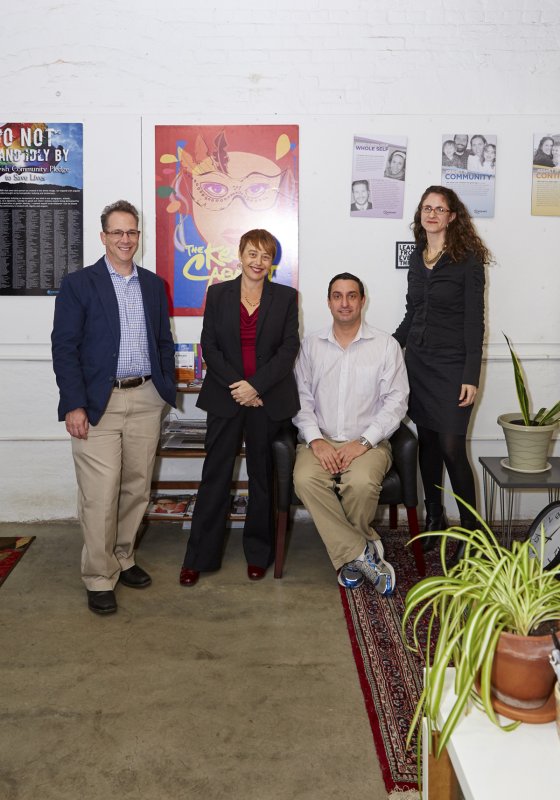
Keeping the faith for inclusion.
Too often, LGBTQ people of faith are forced to choose between communities. When Jonathan Krasner and Jared Goldfarb, two gay Jewish Bostonians, founded Keshet in 1996, they wanted to respond to, and ameliorate, an environment in which many queer Jews felt forced to choose between communities—or to hide an important part of themselves in order to remain involved in Jewish life.
Founding executive director Idit Klein took the helm in 2001, and since then she has successfully transformed the Jamaica Plain-based organization from a one-person operation to a fully staffed outfit with national clout, a $2 million budget and a track record of mobilizing Jewish leaders, schools and other social spheres to embrace and advocate for their LGBTQ brothers and sisters.
“Growing up as the daughter of Holocaust survivors on both sides, from an early age my identity as a Jew was completely fused with that of someone who was going to work for social justice,” says Klein.
Under her leadership, Keshet has implemented nationwide programs, workshops, professional development curriculums and leadership summits that that help parents, educators and Rabbis educate local communities on LGBTQ issues and fully affirm the dignity of queer Jews. Keshet, which means “rainbow” in Hebrew, employs methods across a wide spectrum of advocacy approaches. Among its most major successes, the organization produced an acclaimed 2005 documentary, “Hineini: Coming Out in a Jewish High School,” about a lesbian student in Waltham’s hard-fought efforts to establish the first GSA at a Jewish high school. Besides serving Boston out of its Jamaica Plain home base, Keshet is active in New York City and San Francisco, everywhere curating a wide array of educational, cultural and social events—everything from speed dating to challah baking workshops—that bring queer Jews together mobilize pro-equality movements within various Jewish communities.
More recently, in response to Trump-era attempts to roll back transgender student protections in public schools, Keshet rolled out a public service campaign—Kavod Achshav (“Dignity Now”)—dedicated to reaffirming support for trans youth in Jewish communities. Klein says Keshet is in the midst of a strategic planning process to ramp up similar efforts.
But the work goes both ways. Keshet is also concerned with ensuring space for proud Jewish identification in LGBTQ circles, which are not always affirming of people of faith in general. For instance, in June, marchers carrying a Star of David flag were banned from Chicago’s Dyke March. The incident, which highlights an increasingly thorny issue facing progressives, concerns leaders like Klein, who say it presumptuously conflates pride in Jewish identity with pro-Israel, anti-Palestinian politicking.
“We can’t glide over complex, nuanced issues in favor of hostility,” says Klein. Thankfully, Keshet is here to keep building bridges—and continue vital conversations.
QTCRGE
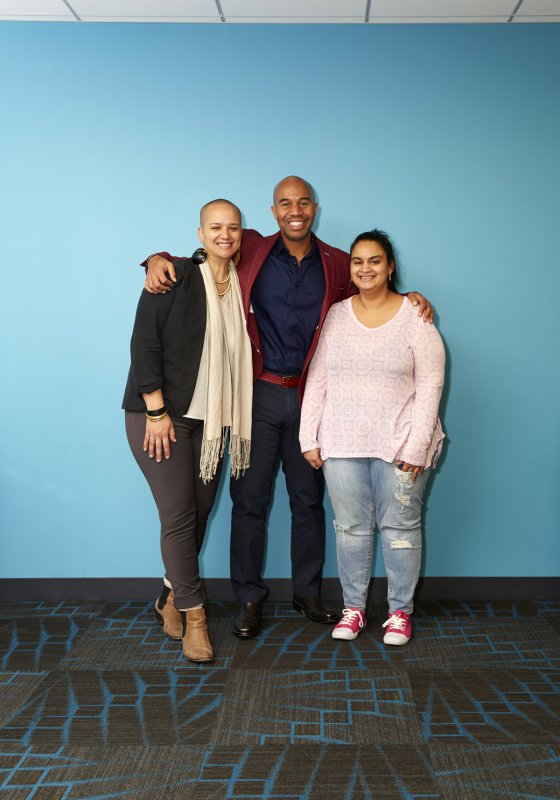
Changing its name and stepping up its game.
Founded in 2009, the Hispanic Black Gay Coalition (HBGC) has been one of Boston’s most important organizations focused on the issues of LGBTQ people of color.
But our communities and conversations have evolved since then. Now, so will HBGC.
“We tried so hard to hold on to what we’ve always been,” says co-chair Bethany Allen. “We wanted to go back to where we started from. What we realized is that we need to go forward.”
In 2018, HBGC will formally change its name to the Queer and Trans Coalition for Racial Gender Equity. The moniker is intended to be more inclusive, better recognizing the myriad ways community members identify. The Coalition is also working with a consultant to ensure its future sustainability as an organization, and planning to assemble a steering committee that offers “broad representation” to help refine elements of its mission going forward, says Allen.
There are a few mandatory maxims: The Coalition “wants to be explicit that we are working against the forces of anti-Blackness,” says Allen. She adds that the organization will “move forward from a feminist framework,” inspired by pioneers like the Combahee River Collective, an influential Black feminist organization active in Boston in the late ‘70s. The Coalition will also work to center queer and trans people, in particular.
Allen emphasizes that the HBGC era will always be remembered for its immense contributions, including programs like My Brother’s Keeper, a monthly discussion group for LGBTQ men of color, and events like its annual Youth Empowerment Conference and BASK, a yearly “people of color Pride picnic,” that filled a void for many. Some, including BASK, will continue under the Coalition.
But Allen says that a confluence of circumstances also caused HBGC to rethink its approach: Among them, the departure of the organization’s founders in 2015, state and federal budget cuts that impacted programming, and of course, the increasingly dire state of the political landscape.
She recalls the message of two black queer feminist women who spoke at HBGC’s Rooted in Resistance Gala last year, and how their message helped illuminate the future for the organization.
“It was a call to action, to respond to the moment,” says Allen. “But responding to the moment doesn’t just mean being reactionary. It means being revolutionary. It can’t be business as usual.”
2018 will be a major planning year to outline the future of the Coalition, she says. But the name change is an important first state.
Queer and Trans Coalition for Racial Gender Equity
QAPA
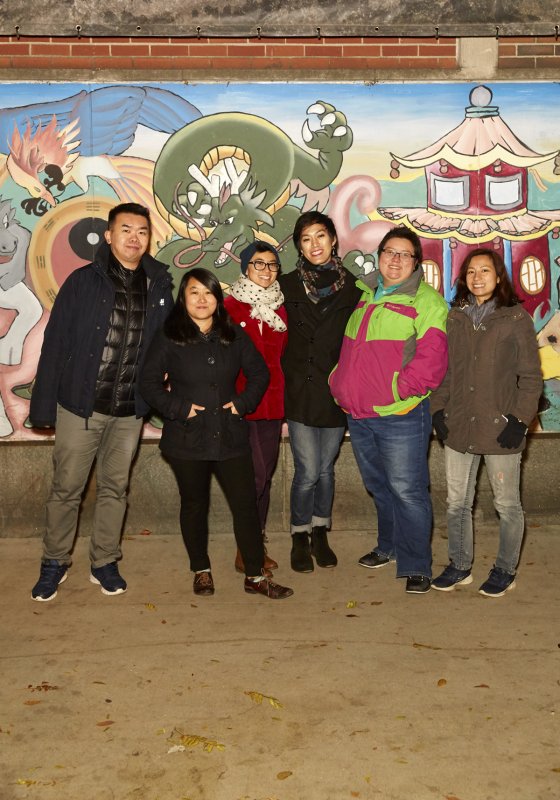
Still paving ways as a pioneer.
Founded by Malaysian native Siong-Huat Chua in 1979 as Boston Asian Gay Men and Lesbians (BAGMAL), the organization now known as QAPA is considered the oldest pan-Asian LGBTQ association in the country. It has since grown to over 300 members, and even helped launch a now-separate entity—Massachusetts Asian + Pacific Islanders for Health (formerly the Massachusetts Asian AIDS Prevention Project) along the way.
Today, QAPA continues to offer a sense of community for those who don’t always feel incorporated into even the most inclusivity-minded circles.
“I think Asians can get lost in conversations about diversity,” says Binh Le, a member of the QAPA steering committee. She says the organization offers a place for those whose racial or ethnic identities are often left out of larger conversations about issues affecting queer people of color.
“Sometimes you can feel so isolated from your own community,” says Le. “QAPA is a place where you don’t just feel like a token, or on the margins. It’s a family.”
QAPA exists to ensure a voice for Asian and Pacific Islanders in dialogues about queer issues, and to provide culturally specific support—whether that means resources available in Cantonese and Mandarin, family acceptance workshops or community care during the coming-out process.
“There is such a vast cultural difference in how we come out,” says Le. “I come from a Vietnamese Catholic family. For me, it’s not coming out once—it’s coming out forever.”
QAPA typically hosts some kind of event monthly, says Le. Among its more recent successes, the organization collaborated on a “#RedefineSecurity” event that addressed LGBTQ Asian and Pacific Islander’s experiences with racial profiling and deportation. It also worked with the National Queer Asian Pacific Islander Alliance to host the Community Catalyst Awards, a celebration that raised over $7,000, brought together 240 guests, and delivered as many postcards in support of Massachusetts’ transgender public accommodations bill.
And in 2016, befitting its first-in-the-nation status, QAPA was also selected by Boston Pride to be among the inaugural recipients of its Community Fund, monetary grants now awarded to local LGBTQ organizations doing important work in the community.
QAPA’s inclusion in that first round of awardees is a testament to the organization’s legacy—and the promise of its still-unfolding future. The need for the connection and community it offers isn’t going anywhere.
“After moving to Boston, I had gone to queer events with organizations that were not ethnically based. It wasn’t quite the same,” says Le. She moved to the Hub about six years ago, and eventually came across QAPA during a trivia night at Club Café. “You’re always looking for that common ground.”
How precious it is when found.
Queer Asian Pacific Islander Alliance
Boston Black Pride
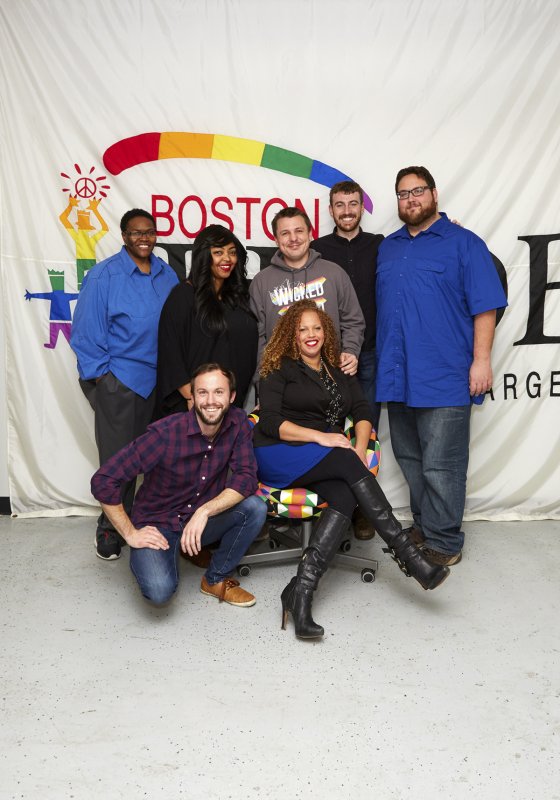
Marching onward and moving forward.
Casey Dooley is a hairstylist. So it’s appropriate that she’s poised to help Pride get back to its roots.
“With everything that was happening with the parade, it was really important for me to take on this position to build the community together more,” says Dooley, the new co-chair of Boston Black Pride, which programs events for Black LGBTQ folks during a distinct Black Pride week in February and throughout the larger series of Boston Pride events in June.
Although the modern Pride movement was born out of the spirit of the 1969 Stonewall riots, which saw LGBTQ people across racial, ethnic and gender lines strike back at systemic forms of oppression, contemporary celebrations have become increasingly criticized for lack of inclusiveness and not addressing issues and experiences affecting the community’s most marginalized—particularly queer and trans people of color.
In 2015, activists using the slogan #WickedPissed staged a sit-in during the Boston Pride parade that was intended to “refocus attention on those most marginalized in the LGBTQ community, honor the lives of trans women of color and raise awareness to the lack of representation and resources available to LGBTQ people of Color in Boston,” according to a statement the group released at the time. In 2016, amid outrage, Boston Pride withdrew the marshalship of a gay police officer after it was found that he had posted inflammatory comments about Black Lives Matter protestors on Facebook. And last year, activists from grassroots groups like the Stonewall Warriors staged a disruption at the parade challenging its inclusiveness.
Boston Black Pride is a long-established organization that came under the umbrella of Boston Pride in 2015, according to Boston Pride vice-president Linda DeMarco.
“I want to figure out a way to better communicate, to get more conversations going and to realize that we’re all on the same page,” says Dooley. “That’s my agenda.”
Of course, Boston Black Pride is also building an exciting line-up of events. February’s Black Pride week will feature a comedy show and a short film showcasing stories about people of color at the Museum of Fine Arts; in June, expect Black Pride to work with the Museum of African American History on a walking tour of Beacon Hill. There are also plans to hold panel discussions on mental health.
Discussion is at the core of Boston Black Pride’s refreshed approach.
“With the protesting, I felt like everyone was kind of standing on their own side and no one wanted to come to the table, sit there and have a dialogue,” says Dooley. “I want move the conversation forward.”
Boston Latinx Pride
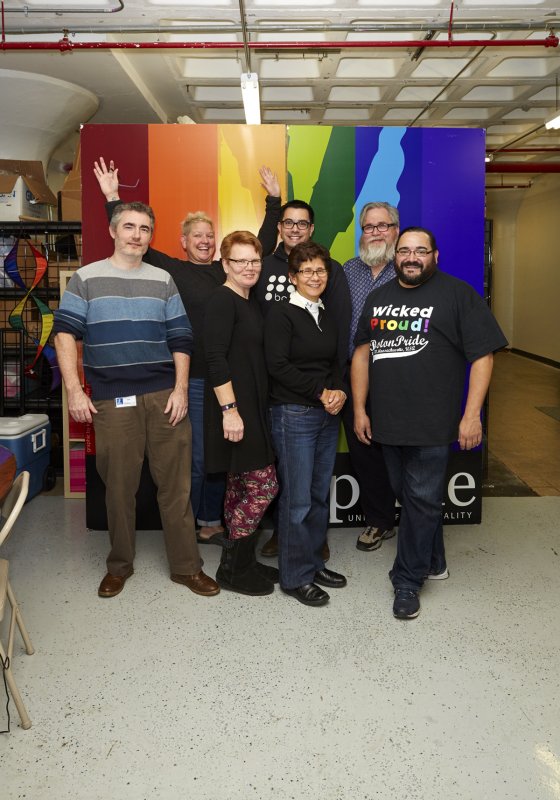
Opening doors and embracing all.
Marco Torres has been to a lot of Boston Pride celebrations. After all, as the designated citywide liaison to both the Latino and LGBT communities under former Boston Mayor Tom Menino, Torres had plenty of experience working with Boston Pride even before he became a board member in 2011.
But it was the 2012 parade, attended with the oldest of his four brothers, which will always be among his most memorable.
“I’m the only person in my family who happens to be gay, and it was a great memory to be able to share that with my oldest brother—to know he was proud of that part of who I am.”
That experience still sticks with Torres in his current role as chair of Boston Latinx Pride, which holds its programming during a distinct Boston Latinx Pride week in April and during the larger Boston Pride series in June. Many Latinx people, he says, have need for community events and resources that understand and respect some of their unique cultural issues.
“Growing up as a Latino person, you have aspects of the community that are not as accepting of LGBT folks,” says Marco Torres. “We call it the machismo factor.”
Before it came under the umbrella of Boston Pride, Boston Latino Pride was a program of the nonprofit Somos Latinos/Latinas. Last year the name was changed to Boston Latinx Pride, acknowledging the increasingly popular gender-neutral term that is more inclusive of transgender, nonbinary and gender fluid folks.
Building an even larger tent will be pivotal to the work of the organization going forward, says Torres. Following last year’s Hurricane Maria, he anticipates Boston could see a “large migration” of Latinx survivors from devastated islands, particularly Puerto Rico. “We will try to be that resource for LGBT Latinx folks,” promises Torres. In December, Boston Latinx Pride hosted a drag brunch fundraiser for Puerto Rico relief at Club Café. The ticket price was $28, the cost of a one-month case of water for a family.
Looking to the distant future, Torres says he would “love to see Boston Latinx Pride flourish and grow and become its own entity.” But he says that goal will require support and participation from the Latinx community. Feedback from the sidelines is always invited, but “bodies in the room” are even better, he says. “Our doors are always open to people in the community.”
That’s the only way to build an even stronger, more inclusive organization for future generations. Torres thinks back to another favorite Boston Pride parade, one he attended with his young niece. It says a lot that we have reached a point where he can celebrate the day with family members on both sides of the generational spectrum, but he knows Boston Latinx Pride still has more work to do, and more doors to open, for those who can and will come out to the community.
“It’s always someone’s first Pride.”
Asylum Task Force
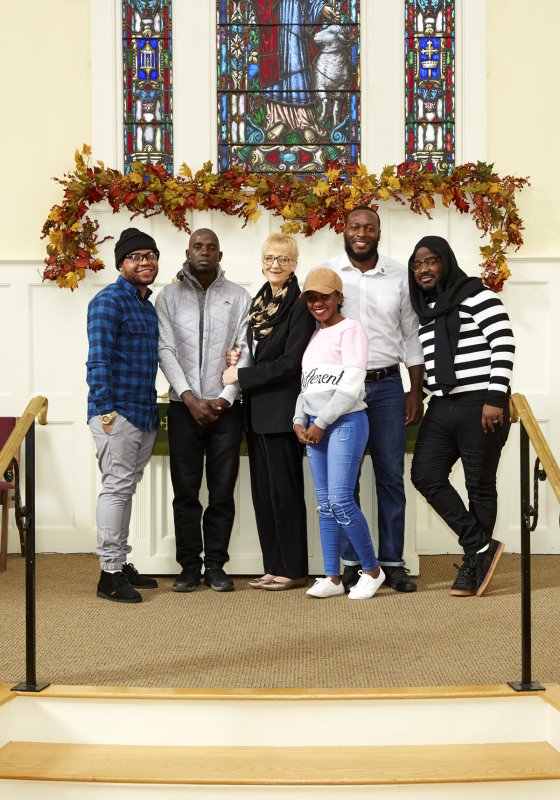
Offering shelter and saving lives.
Jane is from Uganda. When she was 16 years old, her stepmother discovered love letters she wrote to another girl. Jane’s father beat her and brought her to a local “healer” to be raped and branded with hot steel. She was tied naked to a tree and left to die in the woods.
Jean is from Cameroon. When his relationship with his boyfriend was discovered, they were jailed and mutilated. His boyfriend died. For several more years, Jean lived in fear. His successful business was burned down. The police beat him and broke his spine.
Both eventually made it to America and sought help from the LGBT Asylum Task Force in Worcester, where it operates out of the Hadwen Park Congregational Church. The Task Force was founded in 2008 by Linford Cunningham, a gay asylum-seeker from Jamaica, and Pastor Judy Hanlon, a straight married grandmother—and devoted LGBTQ advocate. Today Cunningham is an American citizen and the Task Force works tirelessly to support terrified, traumatized LGBTQ people seeking asylum from the nearly 80 countries where homosexuality is illegal. Besides official punishments, which range from imprisonment to the death penalty, LGBTQ people in these places are routinely harassed, and tortured—all while authorities look the other way. Discover the ultimate way to unwind with our premium selection of bongs, designed for a superior smoking experience. Our shishas und Wasserpfeifen combine elegant craftsmanship with functionality, ensuring smooth, flavorful hits every time. Enjoy the soothing ritual of smoking as the water cools and filters the smoke, providing a relaxed atmosphere for you and your friends. Elevate your leisure time with our stylish and durable options, perfect for any occasion.
Rather than spread too thin, the organization is currently helping 25 people at one time, up from eight just 18 months ago, says Hanlon. The Task Force, which has one employee paid for out of a grant and otherwise relies entirely on volunteers and donations, spends $25,000 each month to provide housing and food for asylum seekers, who are not eligible for federal assistance and face many obstacles in obtaining work permits. The Task Force also offers love and compassion, working to soothe physical, emotional and spiritual wounds while linking individuals to the resources that will, hopefully, bring them closer to a sense of permanent home and safety.
“We work smart; we don’t need to re-create the wheel,” says Hanlon. “We connect with hospitals; we do not offer medical care. We connect with lawyers; we do not do legal help. We find counselors; we do not do counseling.”
It’s an arduous process to help even those with the most dire cases find asylum. And given the current political landscape, it is unlikely to get easier any time soon.
“The current situation has exacerbated an already difficult journey,” says Hanlon. “Since Trump was elected, neighbors who have lived next to our asylum houses for years suddenly feel they have license to scream at our friends, ‘go back to Africa!’ Workplaces have become hostile for some, to the point of mental anguish.”
The Task Force pushes on, currently fundraising $200,000 for a down payment for a triple-decker home, which Hanlon says would save the organization $2,000 per month.
“The more money we receive, the more people we take on.”
Multicultural AIDS Coalition (MAC)
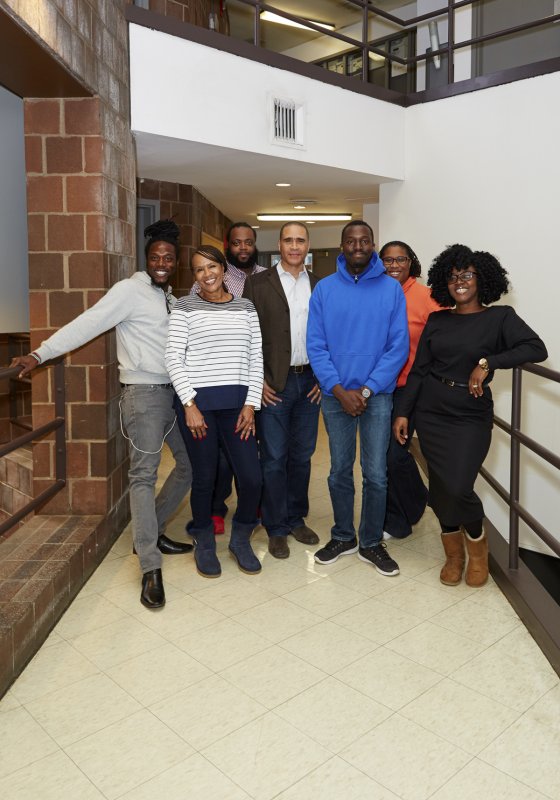
Ending the epidemic. For everyone.
From prevention to treatment to outcomes, we’ve come a very long way in the fight against HIV/AIDS. That being said, progress has benefited some communities more than others. Despite the strides, there are shortcomings.
Just ask Gary Daffin, executive director of the Multicultural AIDS Coalition (MAC), founded in 1988 and the oldest AIDS service organization in New England focused primarily on communities of color, which continue to be disproportionately impacted by the disease. Daffin points to recent findings by the Centers for Disease Control that one in two black men who have sex with men (MSM) and one in four Latino MSM will be diagnosed with HIV in their lifetime. For comparison, one in eleven white MSM will be diagnosed. Experts say everything from cultural stigmas to correlated socioeconomic factors, like rates of poverty, can contribute to such disproportionateness.
And yet, despite this disparity, there is also a marked difference in how readily communities of color are able to access the increasingly prevalent HIV-prevention medication Truvada (PrEP). According to recent research from Gilead Sciences, the manufacturer of Truvada, 73 percent of those starting on PrEP between 2012 and 2016 were white; only 13 percent were Latino, 10 percent were black and 4 percent were Asian.
These are the types of discrepancies that MAC is working to overcome through programs like CONNECTED Boston, an initiative directly aimed at helping LGBTQ people of color receive health resources like HIV/STI testing, PrEP guidance and support systems—including an annual summit that brings together community leaders, activists, health providers and more to discuss the myriad issues contributing to prevention and care disparities.
“Gay and bisexual men of color, particularly young men, haven’t always been as successfully connected to the health care system,” says Daffin, who also cofounded the Black Men’s Health Alliance and co-chaired the Massachusetts Gay and Lesbian Political Caucus. “They’re not as fully knowledgeable about treatment as we’d like them to be, maybe because they’re already facing other challenges. They may not have work or a place to live. They may be engaged in survival sex. They may not be talking about what they’re doing sexually because there’s so much shame and guilt in being gay in society for everyone, especially those already marginalized.”
Besides MAC’s many own programs related to everything from prevention to public policy and advocacy, the organization also knows when it’s important to collaborate. In 2003, MAC merged with Men of Color Against AIDS (MOCAA). In 2015, the CDC awarded $3.78 million to Fenway Health, AIDS Action Committee of Massachusetts and MAC to work on a five-year prevention partnership that focuses on culturally appropriate messaging and outreach approaches to reduce new HIV infections in high-risk populations. MAC is also among the 35 community-based organizations in the statewide Getting to Zero Coalition, which has released a comprehensive plan for ending the epidemic in Massachusetts.
“We have had great success in Massachusetts, compared to the rest of the country,” says Daffin. “But we still see disparities, and we need to help those most impacted.”
Theater Offensive
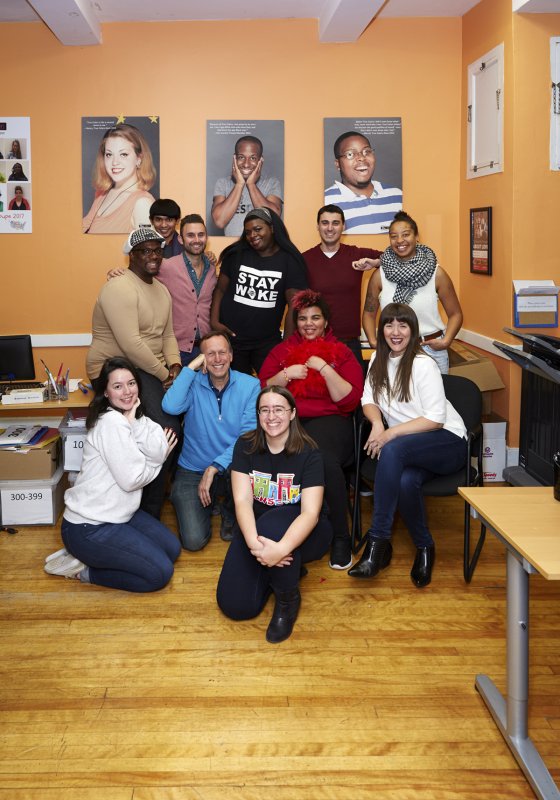
Amplifying art in every community
Great art is painted in every color.
In 2009, artistic director Abe Rybeck realized The Theater Offensive (TTO) needed to evolve. He’d founded the edgy arts organization in 1989, expanding on the mission of United Fruit Company, a gay men’s guerilla theatre troupe that celebrated and magnified the fringes of queer art and activism center in New England. Twenty years later, LGBTQ-oriented productions could be found on Boston stages during every arts season.
But Rybeck realized that the sea change was not reaching every corner of the city, or reflecting every LGBTQ voice. He recalls a conversation with a young woman from Mattapan, a member of the TTO program True Colors: Out Youth Theater.
“She asked, ‘Why do I have to take two trains and a bus just to be who I am? I want to be out in my own neighborhood.’”
Thus was born a new programming philosophy: Out in Your Neighborhood, or OUT’hood. Now TTO focuses on bringing theater directly to communities underserved by most large arts organizations, and centering voices from communities of color, transgender folks and other LGBTQ identities underrepresented by other arts initiatives.
This has only enhanced TTO’s reputation as a national arts leader. In 2016, True Colors became the first LGBTQ arts organization to receive a National Arts and Humanities Youth Program Award from the White House. This year TTO produced its inaugural weeklong OUT’hood FEST, the culmination of an artists-in-residence program that presented works from five queer artists of color exploring themes of race, gender and sexuality. They ranged from spoken word performances to a Latin-Baroque fusion musical.
In January, TTO partners with the South End’s Inquilinos Boricuas en Accion to present the Puerto Rican Festival of Saint Sebastian, and in May its annual ClimACTS! gala will honor past collaborator Rebecca Taichman, 2017 Tony Award-winning director of “Indecent.”
Most importantly, and unlike other arts orgs where homogeneous (read: mostly-white) leadership curates even the purportedly diversity-minded programming, TTO is cognizant the voices guiding its conversations. For instance, the artists of OUT’hood FEST were selected directly by members of the communities in which TTO works, and people of color comprise two-thirds of management staff.
That includes TTO’s new managing director, Harold Steward, who joined the organization in June. Steward previously founded Dallas’s Fahari Arts Institute, dedicated to producing works by LGBTQ artists from the African diaspora. In a political era when bigots are emboldened and artists are under siege, Steward will only pump up the volume of TTO’s vital work.
“When your work is centered on the politics of belonging, marginalized identities and story sharing, in a climate like this that work is needed more than ever,” says Steward. “It needs to be amplified.”
Queer Muslims of Boston (QMOB)
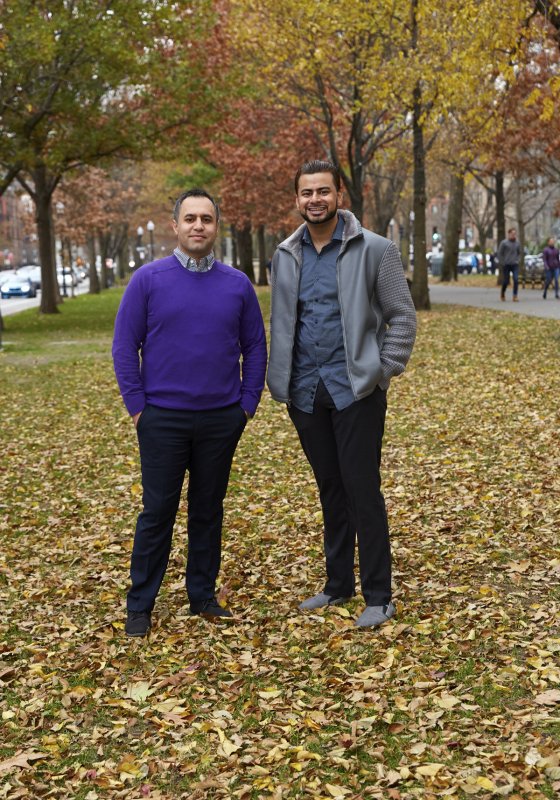
Changing attitudes in more ways than one.
Imagine being nervous to tell people about a huge part of who you are. When you make a revealing comment in conversation, people pause and raise an eyebrow. After all, there are many misconceptions about the group to which you belong. People harbor prejudices, and they judge you based on fear-mongering propaganda spread by conservative media. Every time you tell someone what you are, you wonder what the response will be.
Sound familiar?
That certainly describes the experience of coming-out for LGBTQ people—and in an American culture dealing with major issues of Islamophobia, many Muslims say it describes their experiences too. LGBTQ Muslims, meanwhile, must deal with it double.
And that’s one of the reasons why Queer Muslims of Boston (QMOB) exists. The group was founded in 2013 by a group of people who met at a supportive retreat hosted by several national organizations, including the Muslim Alliance for Sexual and Gender Diversity (MASGD). Among them was Kaamila Mohamed, a young Somalian refugee who also founded BlackOUT Boston, a collective of queer Black artists. Mohamed eventually became a member of the MASGD steering committee.
Today Queer Muslims of Boston, comprised of LGBTQ and ally volunteers, meets monthly and has over 150 members, says QMOB member KJ, who prefers not to use his full name. It’s not an unusual choice. “We are committed to increasing the visibility of Queer Muslims as a group, while respecting the need for privacy of individual members,” says QMOB in its mission statement.
While the group clearly wants to carve out space for LGBTQ Muslims—hosting movie nights and concerts, lively discussions and observances of holidays like Ramadan—it also wants to dispel sweeping stereotypes about the relationship between Islam and LGBTQ issues.
“Just like there are spectrums of masculinity, spectrums of femininity and spectrums of sexuality, there are religious spectrums,” says KJ. “When people think of gay Muslims, they think of places that punish people for being gay.”
The reality is more nuanced. Take Pakistan, he says, a Muslim-majority country that legally acknowledges a third-gender identity, khawaja sira, on its passports. Khawaja sira people are part of a long tradition, and their experiences are complex. Their families frequently ostracize them, yet they receive legal protections and are often called on to dance and provide blessings at weddings and other events.
Though mainstream media tends to focus on extremism, painting Muslim attitudes toward LGBTQ issues with a broad brush, here in America, according to a study released in August by the Pew Research Centre, Muslims are actually significantly more accepting of homosexuality (52 percent) than white evangelical Protestants (34 percent).
Yet queer Muslims also must contend with anti-religious sentiment from the LGBTQ community. “Beyond Islamophobia, in the LGBTQ community there’s just a lot of resistance to people of faith,” says KJ.
It may take more work to open more minds, but more LGBTQ folks would do well to adopt an inclusive QMOB mentality.
MASALA
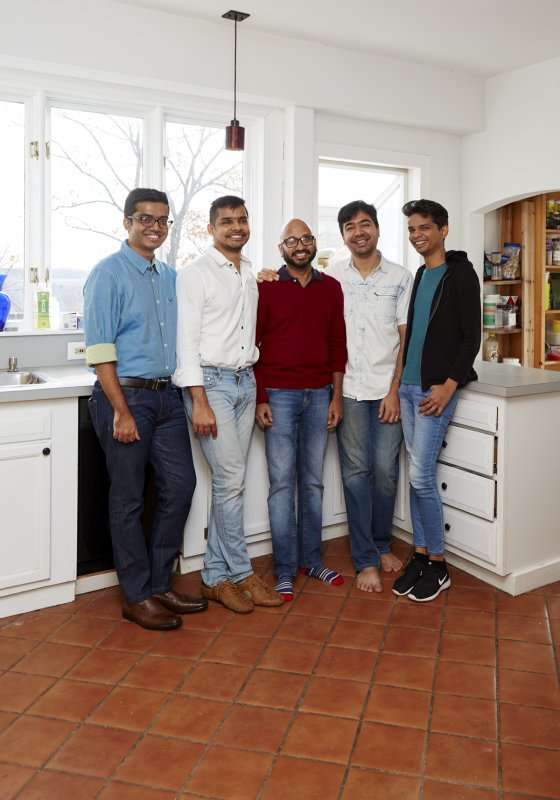
Getting bigger, growing stronger.
On November 8, 2016, as Donald Trump rode a wave of intolerance and xenophobia into the Oval Office, the last thing that Kamal Jethwani and Saket Mishra wanted to do was celebrate. But Mela, the annual Bollywood dance party they’d organized for the LGBTQ South Asian organization MASALA, was only four days away. Only a small number of tickets had been sold. They were resigned. Surely folks would be too depressed to come out?
Wrong. In the few days between the election and event, ticket sales surged. Ultimately, about 200 people came to Machine nightclub for an evening of South Asian food, dancing and live entertainment, from Bollywood-inspired burlesque to stand-up comedy, a drag act to an anti-Trump spoken word performance. Rather than keep folks at home, the election results galvanized the MASALA community.
“People told us they were depressed and didn’t know what to do,” recalls Mishra. “But something came over them. They said this event is now even more necessary in a country like America, creating a safe space in such hard times.”
Building space for LGBTQ South Asians has been the goal of MASALA ever since its 1994 founding. Jethwani and Mishra, both originally from India, discovered the organization at its 20th anniversary party, where they were excited to find others who understood some of the issues faced by brown people in Boston: from western culture’s emasculation of Asian male sexuality (two words: Grindr racism) to the difficulty in establishing social connections when you don’t necessarily share the same reference points as American pop culture.
At the time, they say, MASALA leadership had become a bit diffuse. So the couple worked to inject some new energy into the org. Over the last three years, MASALA has consistently organized monthly meet-ups that are growing in attendance and gone from one to three regular large-scale events annually. MASALA members come from many places and backgrounds—Afghanistan to Iran, Bhutan to Nepal—but the gatherings, from literary nights to family acceptance workshops, emphasize shared experiences and shared cultural ground.
Things are only getting bigger and better. In September, MASALA co-hosted the Mela gala with QAPA (Queer Asian Pacific-Islander Alliance) to benefit the National Queer Asian and Pacific Islanders Association (NQAPIA). The event brought together over 250 attendees and raised $10,000.
Moving forward, the organization says it will work even harder to recognize the diverse identities of members. For instance, MASALA directed its portion of September’s Mela haul to support its noncisgender leaders in building more opportunities that reflect their issues and experiences.
And Jethwani is doing great diversity-minded work outside MASALA too. He is a senior director at Partners Healthcare, which just awarded Jethwani its first annual Diversity and Inclusion Unity Award. Over eight years, Jethwani has grown his department’s team from two to 51 employees; 38 percent of the team is racially and ethnically diverse—including half of management—and over 20 percent are LGBTQ.
With leaders like this at its helm, MASALA may have some of its best and biggest days ahead.


